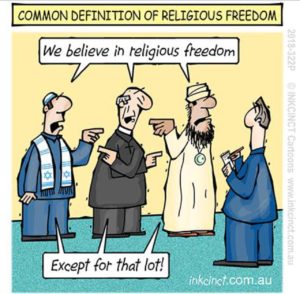CONTEXT AND BROADER IMPLICATIONS OF THE FOLAU SAGA
THE CONTEXT OF ISRAEL FOLAU’S EXPRESSION OF HIS RELIGIOUS BELIEFS REGARDING HOMOSEXUALS
Australian Rugby player and Wallabies fullback, Israel Folau, is in danger of having his multimillion dollar playing contract terminated. Folau says be is being expelled from the game for expressing his religious beliefs about homosexuals.

Israel Folau
As an outspoken member of the Assemblies of God Church, Folau is known for speaking out against homosexuals. In 2018, he posted on Instagram that God’s plan for homosexuals was hell, unless they repent their sins and turn to God. On that occasion, he was allegedly warned by Rugby Australia that any further social media postings, that could be perceived to be homophobic, would be considered a breach of the terms of his contract.
Last month he posted an image on his Instagram page, which has 351,000 followers, that read “Warning: Drunks. Homosexuals. Adulterers. Liars. Fornicators. Thieves. Atheists. Idolaters. Hell awaits you.”
The Response to Folau’s Statement
Rugby Australia’s response was swift. The day after his posting, Rugby Australia issued a notice of their intention to terminate his contract. Whether Folau breached the term’s of his contract will be decided on Saturday, That is when an internal Code of Conduct hearing will determine Folau’s appeal against Rugby Australia’s stated intention to terminate his contract.
The contractual issues, however, are not the subject of this opinion piece

Wallaby, Taniela Tupou
If Folau is permitted to play on, some of his teammates say it will be difficult for them to play with him. Other fellow Tongan players and former players are lining up in support of Folau.
Wallabies hooker Taniela Tupou used Facebook to question the stance that Rugby Australia’s has adopted against Folau. He was quoted as saying, ‘Might as well sack me and all the other Pacific Islands rugby players around the world, because we have the same Christian beliefs’. Tupou also posted that religious belief should have nothing to do with playing Rugby.

Former Wallaby Willie Ofahengaue
Willie Ofahengaue, a Minister of Religion, and the first Tongan to play for the Wallabies, has also issued a statement in defence of Folau. He suggests that Rugby Australia acted too hastily.
While conceding that Folau’s contract contained restrictions, Willie O observed that Folau had only said what he believes. He further observed,
I support what he said. As Christians, we preach what we believe. He has a right to freedom of speech and freedom of religion, and he is talking about what he believes. I think it is a bit hard on him to be sacked for saying what he believes and to face these sorts of consequences.
Willie O specifically addressed the allegation that Folau had attacked gay people. He suggested that what Folau had meant was to make a statement about ‘all sinnners, not just gay people. This, he suggested, was because, ‘We are all sinners and we need to repent.’ On this basis, he argued that ‘People have just taken what he said in the wrong way.
OPINION
The complexities and implications of this matter make it essential that it be resolved and not simply diffused.
For that to occur, any solution will need to be determined, not only on contractual technicalities, but on the merits of broader issues.
Broader Implications
This is not simply a Rugby matter. It concerns a fundamental issue that has never been seriously debated in Australia.
Folau controversy is an opportunity to determine why, how and when it is appropriate to restrict religious beliefs in our multi-faith society.
Not Just a Matter of Legal Interpretation
It is a debate that should be conducted without being constrained by the terms or parameters of our existing laws. We have differing state and federal laws that are fragmented and often inconsistent. These laws reflect the policies of different periods and jurisdictions. Our laws may be described as legal attempts to implement such policies.
The Need For a Publicly Debated and Formulated Policy
We need to openly formulate a policy on the restraint of religious freedoms, and ensure that it, and the reasoning for it, become widely known and understood. In so doing we may well discover that existing policies and laws are no longer appropriate. Equally, we may discover that our increasingly secular population lacks an adequate understanding of religious belief and the notion of free exercise of religion in a multi-faith society.
There are some key observations that need to be made. Freedom to believe whatever I want to believe is fairly meaningless, unless it also encompasses a right to publicly express or act on that belief.
Need to Distinguish Belief from Exercise of Belief
This is what Willie Ofahengaue meant when he argued that Folau had a right to preach what he believed. However, the distinction between belief and acting on it is significant. For example, that a person holds a religious belief that God directs that all adulterers be stoned to death, does not create an issue. However, it is an issue if the person acts on that belief, or proclaims it publicly and causes public concern. Arguably, such a belief goes beyond condemning adultery as a sin. That is because it is also a belief that God requires adulterers to be stoned to death.
On that basis I would suggest that on the one hand we can say that a person is entitled to state their religious belief. On the other, however, we are entitled to question whether we really want people to express religious beliefs that may incite hatred, violence, and even homicide
Limits on Implementing Beliefs
In a multi-faith society, freedom to believe has to be a freedom to believe anything. This includes beliefs that we may consider anti-social or contrary to the fundamental values of our society, or even logic.
Some beliefs are so antisocial that acting on them would constitute a crime. For example, a religious belief that adulterers must be stoned, if acted upon or even expressed would constitute a criminal offence.
Our society’s views on equal rights, include the promotion of equality on the basis of gender or sexual preference. Both of these policies are opposed by particular religious beliefs. Permitting persons, and particularly a high profile persons with 351,000 Instagram followers, holding such religious beliefs to publicise their views arguably undermines society’s endeavours to undo previous discrimination and the negative effects on those who were subject to discrimination.
The question central to the Folau case is whether his expression of anti-gay religious beliefs constitutes a sufficient basis for restricting his freedom to express such religious beliefs?
Respect of Different Beliefs in a Multi-faith Society
People like Folau seem caught up with wanting to proclaim their beliefs, and insist on their right to do so.  In so doing, they appear to overlook the reality that countless others also want to proclaim their various religious or otherwise based views. Where someone is totally convinced of the veracity of their views, and that contrary views are erroneous, they are highly unlikely to have respect for contrary views. Yet, that is precisely what our laws expects.
In so doing, they appear to overlook the reality that countless others also want to proclaim their various religious or otherwise based views. Where someone is totally convinced of the veracity of their views, and that contrary views are erroneous, they are highly unlikely to have respect for contrary views. Yet, that is precisely what our laws expects.
I would suggest that if you respect gay people, you don’t tell them that they are going to hell, even if you believe that to be the case. When you don’t respect other people’s religious pr other truths, you are unlikely to even consider the appropriateness of restraint or compromise.
Privileging Religious Rights
Our society also wish to reassess the formerly held view that religious beliefs should be privileged over others. I suspect that our society no longer makes this distinction. We now prefer broader categorisations such as the freedom to act in accordance with conscience.
Why the change? I don’t see the change as merely reflecting our increasingly secular society. Instead, I suggest that, at lest in part, it is because we no longer have a clear-cut understanding of what Christians believe. For example, a majority of Australian Christians probably have a different understanding of Christianity to Folau. Just like Islam, Christianity encompasses beliefs ranging from the most liberal, to those held by people who would introduce a Republic of Gilead, if they could.
Accommodating All Religious Beliefs
Laws and policies in a multi-faith society simply cannot determine which religious beliefs are right or wrong, genuine or made up. They have to accommodate all beliefs, and protect the rights of those who espouse them. Even a moment’s objective reflection reveals that historically, numerous religious beliefs and actions based on such beliefs, were tempered or discontinued because of changing societal norms.
On this basis, I suggest that it is not the impact of Folau’s words on homosexuals that should be determinative of whether he should be able to express his beliefs. Instead it needs to be the effect on social harmony and our society’s stance on protecting minorities that determine whether the limit of Folau’s right to express his beliefs has been exceeded.
Some may take offence at what I have said as my comments may appear to paint religious beliefs in a negative light. To that I would reply that while my comments may not apply to your religious beliefs, we probably would agree that there are countless wacky, evil, hateful and downright dangerous religious beliefs, the expression of which the law needs to keep in check. Whether this includes Folau’s expression of his religious beliefs is far less clear.
I reiterate my argument that our society needs to wipe the slate clean. This is required in order to consider the basis on which we determine how to accommodate religious beliefs that are at odds with those held by other sectors of society, and with laws and policies seeking to promote mutual respect, coexistence and harmony in our society.
Framed in this way, it is apparent that those whose beliefs compel them to condemn rather than respect others, are most at risk of having the expression of their views restricted.
One Way of Determining Whether Restricting a Right is Justified
I conclude with an outline of one legal test employed to determine the legality of legislative restraints on a freedom such as the freedom of religion. While this test is used to determine the validity of laws restricting freedoms, it May also prove relevant to a case such as the restraint of Falau’s right to express his religious belief.
The Proportionality Test as defined by the High Court of Australia requires three questions to be answered —
1. Is the freedom burdened by a law’s terms, operation or effect? If the answer is yes;
2. Are the means adopted to achieve the law’s purpose such that they do not adversely impinge on our system of representative government? If the answer is yes;
3. Is the restriction imposed justified? In terms of being:
a. Suitable – ie a rational connection to it’s stated purpose
b. Necessary – ie no obvious and compelling alternatives, and
c. Adequate in its balance – where importance of purpose outweighs extent of restriction.